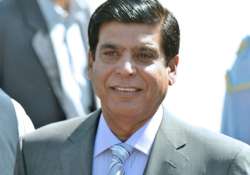PM leaves for Quetta as blasts' victims remain unburied
Islamabad, Jan 13: Prime Minister Raja Pervez Ashraf today left for Quetta to assess the security situation in the southwestern Pakistani city in the wake of unprecedented protests over the killing of nearly 100 Shias

Islamabad, Jan 13: Prime Minister Raja Pervez Ashraf today left for Quetta to assess the security situation in the southwestern Pakistani city in the wake of unprecedented protests over the killing of nearly 100 Shias in bomb attacks last week.
Ashraf, accompanied by Information Minister Qamar Zaman Kaira and Postal Services Minister Umar Gorgage, flew to Quetta this morning, state-run media reported.
The premier is expected to meet law enforcement officials and Balochistan Governor Zulfiqar Magsi to assess the security situation, officials were quoted as saying by TV news channels.
The premier's decision to visit Quetta came as a protest by Hazara Shias entered the third day today. Thousands of Shias have gathered at Alamdar Road in Quetta with the bodies of over 80 victims of the bomb attacks on Thursday.
Shia leaders have said the dead will not be buried till the Balochistan government is dismissed and the army takes control of Quetta.
They have accused some provincial ministers of backing sectarian groups like the banned Lashkar-e-Jhangvi, which claimed responsibility for Thursday's attacks in Alamdar Road, a Shia-dominated neighbourhood.
Balochistan Chief Minister Aslam Raisani is currently on a private visit to Dubai and reports from Quetta suggested the provincial administration was completely inactive as no senior leaders were available to make decisions.
There were no indications when Raisani would come back to Pakistan though he was directed by the premier to return immediately yesterday.
Official sources said the federal government could make "some important decisions" regarding the situation in Quetta today. The sources did not rule out the possibility of Governor's Rule being imposed in Balochistan.
The protest by the Shias in Quetta yesterday inspired similar demonstrations in cities across the country, including Islamabad, Rawalpindi, Lahore, Karachi, Multan, Gujranwala and Hyderabad.
Members of civil society and Shia groups organised sit-ins which they said would continue till the dead are buried in Quetta.
In Islamabad, Lahore and Karachi, dozens of people remained at the sit-ins through the night despite the biting cold.
They lit candles and shouted slogans against sectarian groups responsible for violence against the minority Shia community.
The Hazara Shias, who migrated from Afghanistan almost a century ago, have been repeatedly targeted in a series of attacks blamed on the Lashkar-e-Jhangvi and Sipah-e-Sahaba.
Scores of people have died in these attacks.
Ashraf, accompanied by Information Minister Qamar Zaman Kaira and Postal Services Minister Umar Gorgage, flew to Quetta this morning, state-run media reported.
The premier is expected to meet law enforcement officials and Balochistan Governor Zulfiqar Magsi to assess the security situation, officials were quoted as saying by TV news channels.
The premier's decision to visit Quetta came as a protest by Hazara Shias entered the third day today. Thousands of Shias have gathered at Alamdar Road in Quetta with the bodies of over 80 victims of the bomb attacks on Thursday.
Shia leaders have said the dead will not be buried till the Balochistan government is dismissed and the army takes control of Quetta.
They have accused some provincial ministers of backing sectarian groups like the banned Lashkar-e-Jhangvi, which claimed responsibility for Thursday's attacks in Alamdar Road, a Shia-dominated neighbourhood.
Balochistan Chief Minister Aslam Raisani is currently on a private visit to Dubai and reports from Quetta suggested the provincial administration was completely inactive as no senior leaders were available to make decisions.
There were no indications when Raisani would come back to Pakistan though he was directed by the premier to return immediately yesterday.
Official sources said the federal government could make "some important decisions" regarding the situation in Quetta today. The sources did not rule out the possibility of Governor's Rule being imposed in Balochistan.
The protest by the Shias in Quetta yesterday inspired similar demonstrations in cities across the country, including Islamabad, Rawalpindi, Lahore, Karachi, Multan, Gujranwala and Hyderabad.
Members of civil society and Shia groups organised sit-ins which they said would continue till the dead are buried in Quetta.
In Islamabad, Lahore and Karachi, dozens of people remained at the sit-ins through the night despite the biting cold.
They lit candles and shouted slogans against sectarian groups responsible for violence against the minority Shia community.
The Hazara Shias, who migrated from Afghanistan almost a century ago, have been repeatedly targeted in a series of attacks blamed on the Lashkar-e-Jhangvi and Sipah-e-Sahaba.
Scores of people have died in these attacks.